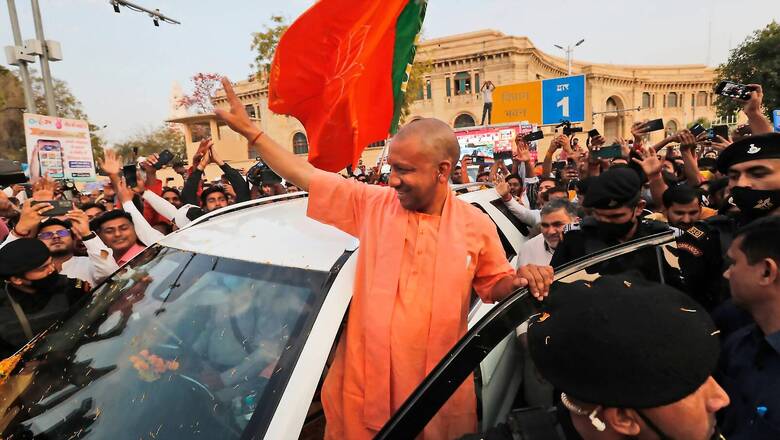
views
When Akhilesh Yadav left his Lok Sabha seat of Azamgarh after the Samajwadi Party’s defeat in the 2022 Uttar Pradesh Assembly elections, commentators thought that he was finally getting serious about politics. The Muslim face of the party, Azam Khan, also left his Lok Sabha seat of Rampur. Probably the two decided to toil hard in the state to counter Yogi Adityanath and his ministers in the Assembly. Moreover, Azamgarh and Rampur being the strongholds of the Samajwadi Party owing to their traditional Muslim plus Yadav vote-banks, the re-election of the SP candidates seemed a cakewalk for Akhilesh Yadav. But in Narendra Modi’s BJP and Yogi’s Uttar Pradesh, no leader can take the risk of being complacent of having vote-banks in his pocket.
The results of the bypolls in Rampur and Azamgarh made Akhilesh sulk further. The Samajwadi Party lost both of its traditional strongholds to BJP — Rampur with the margin of 42,192 votes, and Azamgarh with 8,679 votes. These results have two lessons for the Samajwadi party, political commentators and even for the Bharatiya Janata Party. First, with a Modi-Yogi double engine in place, and in a multi-party election, now it’s not un-imaginable for the BJP to even win all the 80 Lok Sabha seats in Uttar Pradesh. Second, Akhilesh Yadav has to graduate to a full-time politician position from a Twitter and press-conference type politician to be able to enjoy Mulayam Singh Yadav’s political legacy.
Since the time Akhilesh Yadav has wrested the party from his father and uncles, the SP has only seen the downhill. In 2014, it lost the Lok Sabha elections in UP; this was followed by losses in the 2017 Assembly and municipal elections, the 2019 Lok Sabha elections, the 2021 panchayat elections, the Assembly elections, and now the defeat in Rampur and Azamgarh bypolls. For Akhilesh Yadav electoral success formula seems to be a simple addition of multiple vote-banks. Since 2014, the SP has tried all the permutations and combinations — going with the Congress, partnering with the BSP, aligning with smaller parties, and contesting alone — but all these lazy attempts have failed in front of the hard working electoral and governance models of Modi and Yogi.
What’s worrying for the Samajwadi Party is that it is not yet ready to introspect. After the recent bypoll defeats, SP spokespersons were on an offensive, blaming the BSP for cutting into the SP votes, the media for not showing the truth, the UP administration for not allowing ‘fair elections’, and, worse, the people of UP are being gullible and naïve to vote for a wrong party. I can understand that defending their respective parties is any spokesperson’s job, but hopefully inside close doors someone in the SP should have the gumption to ask Akhilesh Yadav why his attendance in the 17th Lok Sabha was dismal 36%? Why did he ask a single question in the Lok Sabha post 2019, representing the people of Azamgarh? Why did he not campaign even for a single day for the Rampur and Azamgarh bypolls? Unfortunately, no ‘karyakarta’ in these family-based parties can ask these questions to their respective bosses. It’s evident in Samajwadi circles that the tiff between Akhilesh and Azam Khan caused them the Rampur seat, and the differences within the Yadav clan whether to give the ticket to Dimple Yadav or Dharmendra Yadav from Azamgarh, kept Akhilesh away from campaigning.
The BJP too has its share of organisational challenges. Its state unit is in a transitional phase and waiting for the new state president to be elected. Yet, the BJP’s party organisation led by Swatantra Dev Singh and Sunil Bansal has ensured that the party puts its full might, strategy and conviction behind these bypolls. Yogi, though engaged in shaping multiple new governance initiatives, monitoring meetings, and launches in his second term, led the bypolls from the front. He campaigned on both the seats. He put his personal weight behind these bypolls. This time, the BJP did not even trouble PM Modi for campaigning. The goodwill of Modi’s schemes, well implemented in the state by the Yogi government has created a strong beneficiary cadre, which is ready to take on any traditional vote banks.
With Rampur and Azamgarh wins, Yogi’s juggernaut continues in UP.
Shantanu Gupta is the author of ‘The Monk Who Became Chief Minister’ and ‘The Monk Who Transformed Uttar Pradesh’. The views expressed in this article are those of the author and do not represent the stand of this publication.
Read all the Latest News , Breaking News , watch Top Videos and Live TV here.




















Comments
0 comment